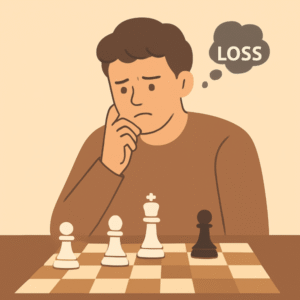How to Save a Lost Game?
♟️ How to Save a Lost Game?
Every chess player has found themselves in a hopeless position at least once. Everything seems lost: your pieces are misplaced, time is running out, and your opponent is pressing hard. But even in such situations, there’s a way out — if you know the right principles of defense. In chess, as in life, the game isn’t over until you give up. 
1. Don’t Panic — Assess the Position Calmly
The first thing you must do is stop the inner panic. Mistakes often happen when you rush. Look at the board objectively: where are your opponent’s weaknesses? Which of your pieces are still active? Is there a chance for perpetual check or counterplay? Sometimes, even a single precise move can completely change the situation.
2. Seek Activity and Counterplay
In a bad position, passive defense almost always leads to defeat. Find a way to create threats — attack a pawn, prepare a hidden check, or put pressure on a weak piece. Even if your threat isn’t deadly, it will force your opponent to defend and spend time, giving you a fighting chance.
3. Use Psychology
Many players relax when they feel they’re already winning. Provoke them into mistakes — complicate the position, change the rhythm, or stretch out the game in blitz. Sometimes, psychological pressure is what saves a hopeless position.
4. Perpetual Check, Stalemate, and Traps
Even when you’re far behind materially, there are defensive resources — perpetual check, stalemate, or drawn endgames. Knowing these patterns helps you find chances when everything seems lost. Many great masters have saved games this way.
5. Learn from the Masters
Study the games of champions who’ve escaped impossible situations. Players like Magnus Carlsen and Mikhail Tal were famous for their resilience and creativity in defense. Analyze how they created counterplay and how persistence turned losses into draws — or even victories.
♜ Conclusion
Saving a lost game requires character, patience, and composure. Even if the position looks desperate, there’s always hope. The key is to keep searching, thinking, and fighting until the end. Chess is not only about winning — it’s also about the art of never giving up.